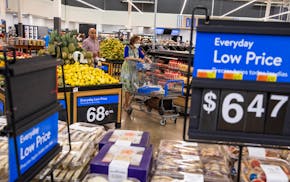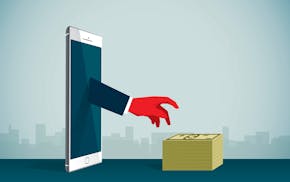Best Buy knew there would be a slump in demand for consumer electronics during the holiday season.
But customers bought fewer appliances and electronics than five-plus years ago during the most important final retail quarter, leading to a 42% profit decline for the Richfield-based company, which also announced plans Thursday to continue to close stores.
Best Buy is the last major U.S. retailer to specialize in home electronics, and its financial results could serve as a bellwether of issues to come for the industry, experts say.
"I think there is a recession in consumer electronics," said Neil Saunders, managing director for analytics firm GlobalData's retail division. "The spend is down quite consistently, and it's also down pre-pandemic. It is a sign of wider trends."
Best Buy's sales sank the entire year as consumers shifted their spending to other purchases, such as travel and entertainment, after stocking up on home electronics during the height of the pandemic. Comparable sales — those at stores open at least a year — declined 9.9% for the fiscal year, which ended in January.
In its fiscal fourth quarter, sales fell 9.3%. Best Buy earned $495 million for the quarter, or $2.23 a diluted share. It matched analyst expectations of $14.7 billion in revenue and came in a little higher than the consensus prediction of $2.11 a share. However, profits were still down 20.9% from the quarterly net earnings of $626 million a year ago. Best Buy shares closed down 2%.
While the quarterly and total year profits dropped, Best Buy CEO Corie Barry expressed confidence in her company's ability to persist despite more volatility to come.
"I am incredibly proud of our team's execution during what continues to be a challenging environment for our industry and we believe even against that backdrop we at least maintained, if not gained share in our industry," she said.
Burdened with higher prices for food, energy and other needs from November through January, consumers spent less on home electronics. As a result, revenue dipped about 10% compared with the year before.
"We have had things like new iPhones come out ... but the phones are fundamentally the same thing that came before," Saunders said. "A lot of people aren't interested in buying tablets or laptops because there just isn't enough innovation."
Barry said she is optimistic a hot, new gadget will eventually emerge, as she pointed to advances in augmented reality, dual-screen and foldable laptops as well as appliance personalization.
"Innovation has largely been paused since the pandemic began, and the focus shifted to production," she told analysts.
Another challenge for Best Buy is growing competition from other retailers with improving store electronics sections, including Target, Costco and Walmart, said Scott Mushkin, founder and managing partner of retail research and consulting firm R5 Capital.
Mushkin, who travels the country to analyze stores, said he has seen some Best Buy stores that look "really substandard."
Throughout the past three years, as Best Buy has adjusted its business model and cut costs, the company has cut about 25,000 workers, or 20% of its workforce. With fewer employees, Mushkin said, the quality of customer service diminishes and stocking issues become more frequent.
After shuttering about 70 large-format stores, or 7% of its portfolio, in the past three years, Best Buy says more closings lie ahead. This year, it plans to shutter around 20 to 30 of its larger stores and expects to close an average of 15 to 20 stores each year after that.
In just this week, the company is shutting down 17 stores, including the Shakopee location Saturday. Meanwhile, the Blaine store will temporarily be shut down during its conversion into an outlet store.
"[Best Buy's] business model, in our mind, is ... teetering," Mushkin said. "You're closing stores. Store conditions have deteriorated because you're cutting labor to maintain profitability. We're not in a good cycle.
"The economy looks like it's going to work ... against you, and you've got your competitors out for the money that your vendors give you. You're not in a great situation."
There could be some relief in sight later this year — though that's more likely in 2024 and 2025 — when consumers start to upgrade and replace technology they bought early in the pandemic, Barry said.
For the current fiscal year, Best Buy predicts comparable sales to decline 3% to 6%.
In the meantime, Best Buy has continued to make long-term investments, such as growing its products in new categories, including electric transportation and over-the-counter hearing aids.
It is also reimagining some of its stores. Some remaining larger Best Buys will be converted into "experience stores," designed to allow people to test new products, while other stores will scale down their sales floor to provide more space for backroom fulfillment. New small-format and outlet stores also are planned.
"The purpose of the changes we're making," Barry said, "is, first and foremost, to meet a changing customer."
Minnesota's med spa industry rises in popularity — and with little regulation

Ramstad: Readers say Walmart won't be paying the ultimate price of Trump's tariffs

How Minnesota businesses can spot and prevent invoice fraud
No place for cryptocurrency in retirement portfolios
